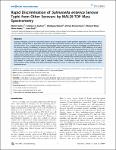Rapid Discrimination of Salmonella enterica Serovar Typhi from Other Serovars by MALDI-TOF Mass Spectrometry
Kuhns, Martin
Zautner, Andreas E.
Rabsch, Wolfgang
Zimmermann, Ortrud
Weig, Michael
Bader, Oliver
Groß, Uwe
Systemic infections caused by Salmonella enterica are an ongoing public health problem especially in Sub-Saharan Africa. Essentially typhoid fever is associated with high mortality particularly because of the increasing prevalence of multidrug-resistant strains. Thus, a rapid blood-culture based bacterial species diagnosis including an immediate sub-differentiation of the various serovars is mandatory. At present, MALDI-TOF based intact cell mass spectrometry (ICMS) advances to a widely used routine identification tool for bacteria and fungi. In this study, we investigated the appropriateness of ICMS to identify pathogenic bacteria derived from Sub-Saharan Africa and tested the potential of this technology to discriminate S. enterica subsp. enterica serovar Typhi (S. Typhi) from other serovars. Among blood culture isolates obtained from a study population suffering from febrile illness in Ghana, no major misidentifications were observed for the species identification process, but serovars of Salmonella enterica could not be distinguished using the commercially available Biotyper database. However, a detailed analysis of the mass spectra revealed several serovar-specific biomarker ions, allowing the discrimination of S. Typhi from others. In conclusion, ICMS is able to identify isolates from a sub-Saharan context and may facilitate the rapid discrimination of the clinically and epidemiologically important serovar S. Typhi and other non-S. Typhi serovars in future implementations.
Files in this item
No license information

